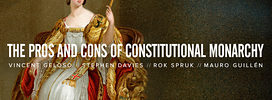One of the arguments I have put in my contributions is that in thinking about government and governance, one should distinguish between the sacral or ritual aspect and the efficient or business one. The relevance of this distinction to the current discussion for me is that ceremonial monarchy is concerned only with the sacral and ritual or ceremonial aspect and not the business or efficient. Although contemporary European monarchies are the example most often given, the best example is Japan, where the role of the Emperor has been purely ceremonial for most of its very long history and with the business or effective side carried out by the Shogun or holders of other positions.
Not everyone accepts this distinction, to put it mildly. For some, the sacral function of monarchy is something vestigial, a political equivalent of the appendix. Others would have it that flummery and ritual and grand titles and forms of address are a species of mystification, intended to obscure and gloss the sordid realities of power. The widespread acceptance of these kinds of argument shows something important. Today political argument and philosophy has almost entirely lost sight of the sacral aspect of political power and government, and to the extent that it does take notice of it, regards the sacral as trivial and unimportant. This is a major departure from several of the world’s intellectual traditions and is also profoundly short-sighted. In Confucianism for example, ritual and ceremonial has a central place in political theory and practice. The same is true of most pre-modern political theory, never mind the practice.
In this, pre-modern political theory was closer to reality. The sacral is a persistent and important feature of collective human affairs and seems to derive from structural and fixed qualities of human nature. All political life in practice involves rituals and symbols, and these often have great power. We only need think for example of the place of the flag and other symbols of nationhood in American politics, or the importance of public ceremonials such as the public inauguration and swearing in of presidents. The form and details of these vary from one part of the world to another and often have a remarkable persistence over time. It is a delusion to think that government can be reduced to a combination of technocratic administration and media spectacle (which is what elections have largely become). The importance of both monarchy and long-established republican forms in this context is that they recognize and express this function of governance in a way that produces stability and continuity as well as development.
When this is denied, by attempts at revolution or abrupt modernization or political rupture, the result is not that political life is emptied of its sacral aspect. Rather it reappears but in monstrous or distorted form. The twentieth century gives many examples of this. Thus Stalin became a figure like the tsar for many Russians, complete with a symbolic role as father and guide of the people. In China, Mao took on many of the qualities and traditional features of an Emperor—in fact he self-consciously modelled himself on Chin Shih Huang-Ti the psychopathic megalomaniac who founded the Chinese Empire in 221 BC. In North Korea Kim Il Sung and his heirs have all of the ritual and symbolic qualities of the old Korean monarchs while also holding unchecked power—a truly bad combination.
All this raises two questions. Firstly, historically the sacral power was indeed often combined with the practical or effective, with the same person wielding both. This remains the case in presidential political systems with a separation of powers, such as the United States. In these cases, the sacral function can indeed lend a patina of legitimacy to the often sordid details of pragmatic politics, not least by giving some criticism a quality of lèse-majesté. The question is whether this is the default position. Certainly it was the commonest historically but there are enough exceptions, such as Japan, to suggest that it was not. A common qualification was to have all or a significant part of the sacral function performed by a religious figure with a secular ruler performing the business aspect—this was the case in Bhutan to give one example. There are many reasons for thinking that it is better to separate the two, and to leave the people performing the practical side of affairs to be seen for what they are and subject to criticism and (often) ridicule. George Orwell captured this when he argued that one reason why fascism had not caught on in the UK as compared to much of Continental Europe was that the power and the ceremonial pomp and glory were separated. The grand rituals were associated with a powerless old man in a gilded coach while the business of politics and government was carried on by boring men in badly fitting suits. In other words, the dangerous combination of actual power and charismatic or sacred power was avoided. His argument also applied to other established constitutional monarchies, such as the Scandinavian ones and those of Belgium and the Netherlands, which did all indeed resist the lure of fascism and communism.
The other question is the interesting one for a historian of why contemporary political thought takes so little notice of the sacral aspect of government. Undoubtedly part of the explanation lies in the decline of religious thinking and of explicit religion or religious tradition as the public doctrine of the state. Another reason is the growth over the course of the twentieth century of a technocratic or instrumental mindset which sees the sacral as merely superstitious and unnecessary. That though does pose the question of where that contemporary mindset has come from and how it has come to be so powerful and pervasive. This is a fertile field for historical enquiry.

